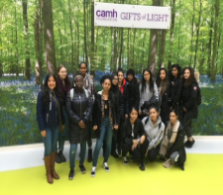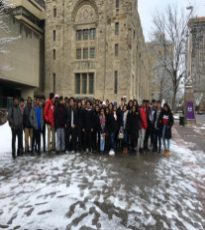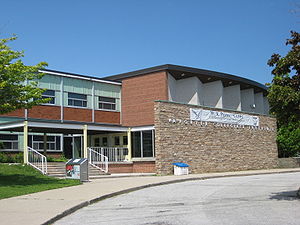
SATEC is lucky to have a vibrant and diverse Social Science Department. Our department encompasses Geography, History, Social Sciences, and Family Studies. We offer a wide array of courses at the Academic, Open, Mixed, College and University levels.
When you sign up for a Social Science course, you will engage in hands-on, technological and inquiry-based learning. Field trips are a key part of learning as well. Check out some of our past field trips!


See our photobook here!
https://photos.google.com/album/AF1QipMp9xzCOi2kHTvj8HKoDM65qGo3o5Ofs-f-fwlx
Our Courses
Grade 9 and 10 - Mandatory
CGC1D1 - Issues in Canadian Geography
This course examines interrelationships within and between Canada’s natural and human systems and how these systems interconnect with those in other parts of the world. Students will explore environmental, economic, and social geographic issues relating to topics such as transportation options, energy choices, and urban development. Students will apply the concepts of geographic thinking and the geographic inquiry process, including spatial technologies, to investigate various geographic issues and to develop possible approaches for making Canada a more sustainable place in which to live
CHC2D1 - Canadian History since World War I
This course explores social, economic, and political developments and events and their impact on the lives of different groups in Canada since 1914. Students will examine the role of conflict and cooperation in Canadian society, Canada’s evolving role within the global community, and the impact of various individuals, organizations, and events on Canadian identity, citizenship, and heritage. They will develop their ability to apply the concepts of historical thinking and the historical inquiry process, including the interpretation and analysis of evidence, when investigating key issues and events in Canadian history since 1914.
CHV201- Civics and Citizenship
This course explores rights and responsibilities associated with being an active citizen in a democratic society. Students will explore issues of civic importance such as healthy schools, community planning, environmental responsibility, and the influence of social media, while developing their understanding of the role of civic engagement and of political processes in the local, national, and/or global community. Students will apply the concepts of political thinking and the political inquiry process to investigate, and express informed opinions about, a range of political issues and developments that are both of significance in today’s world and of personal interest to them.
Grades 11 and 12 - Optional
CLU3M1 - Understanding Canadian Law
This course explores Canadian law, with a focus on legal issues that are relevant to the lives of people in Canada. Students will gain an understanding of laws relating to rights and freedoms in Canada; our legal system; and family, contract, employment, tort, and criminal law. Students will develop legal reasoning skills and will apply the concepts of legal thinking and the legal studies inquiry process when investigating a range of legal issues and formulating and communicating informed opinions about them.
CGG30 - Travel and Tourism: A Geographic Perspective
This course focuses on issues related to travel and tourism within and between various regions of the world. Students will investigate unique environmental, sociocultural, economic, and political characteristics of selected world regions. They will explore travel patterns and trends, as well as tensions related to tourism, and will predict future tourism destinations. Students will apply the concepts of geographic thinking and the geographic inquiry process, including spatial technologies, to investigate the impact of the travel industry on natural environments and human communities.
HSP3U - Introduction to Anthropology, Psychology, and Sociology
This course provides students with opportunities to think critically about theories, questions, and issues related to anthropology, psychology, and sociology. Students will develop an understanding of the approaches and research methods used by social scientists. They will be given opportunities to explore theories from a variety of perspectives, to conduct social science research, and to become familiar with current thinking on a range of issues within the three disciplines.
HFC3M1 - Food and Culture
This course focuses on the flavours, aromas, cooking techniques, foods, and cultural traditions of world cuisines. Students will explore the origins of and developments in diverse food traditions. They will demonstrate the ability to cook with ingredients and equipment from a variety of cultures, compare food-related etiquette in many countries and cultures, and explain how Canadian food choices and traditions have been influenced by other cultures. Students will develop practical skills and apply social science research methods while investigating foods and food practices from around the world.
CLN4U - Canadian and International law
This course explores a range of contemporary legal issues and how they are addressed in both Canadian and international law. Students will develop an understanding of the principles of Canadian and international law and of issues related to human rights and freedoms, conflict resolution, and criminal, environmental, and workplace law, both in Canada and internationally. Students will apply the concepts of legal thinking and the legal studies inquiry process, and will develop legal reasoning skills, when investigating these and other issues in both Canadian and international contexts.
CPW4U - Canadian and International Politics
This course explores various perspectives on issues in Canadian and world politics. Students will explore political decision making and ways in which individuals, stakeholder groups, and various institutions, including governments, multinational corporations, and non-governmental organizations, respond to and work to address domestic and international issues. Students will apply the concepts of political thinking and the political inquiry process to investigate issues, events, and developments of national and international political importance, and to develop and communicate informed opinions about them.
CGW4U/C - World Issues: A Geographic Analysis
In this course, students will address the challenge of creating a more sustainable and equitable world. They will explore issues involving a wide range of topics, including economic disparities, threats to the environment, globalization, human rights, and quality of life, and will analyse government policies, international agreements, and individual responsibilities relating to them. Students will apply the concepts of geographic thinking and the geographic inquiry process, including the use of spatial technologies, to investigate these complex issues and their impacts on natural and human communities around the world.
HFA4U - Nutrition and Health
This course examines the relationships between food, energy balance, and nutritional status; the nutritional needs of individuals at different stages of life; and the role of nutrition in health and disease. Students will evaluate nutrition-related trends and will determine how food choices can promote food security and environmental responsibility. Students will learn about healthy eating, expand their repertoire of food-preparation techniques, and develop their social science research skills by investigating issues related to nutrition and health.
HSB4U - Challenge and Change in Society
This course focuses on the use of social science theories, perspectives, and methodologies to investigate and explain shifts in knowledge, attitudes, beliefs, and behaviour and their impact on society. Students will critically analyse how and why cultural, social, and behavioural patterns change over time. They will explore the ideas of social theorists and use those ideas to analyse causes of and responses to challenges such as technological change, deviance, and global inequalities. Students will explore ways in which social science research methods can be used to study social change.
HZT4U - Philosophy: Questions and Theories
This course enables students to acquire an understanding of the nature of philosophy and philosophical reasoning skills and to develop and apply their knowledge and skills while exploring specialized branches of philosophy (the course will cover at least three of the following branches: metaphysics, ethics, epistemology, philosophy of science, social and political philosophy, aesthetics).∗ Students will develop critical thinking and philosophical reasoning skills as they formulate and evaluate arguments related to a variety of philosophical questions and theories. They will also develop research and inquiry skills related to the study and practice of philosophy.

https://www.tdsb.on.ca/